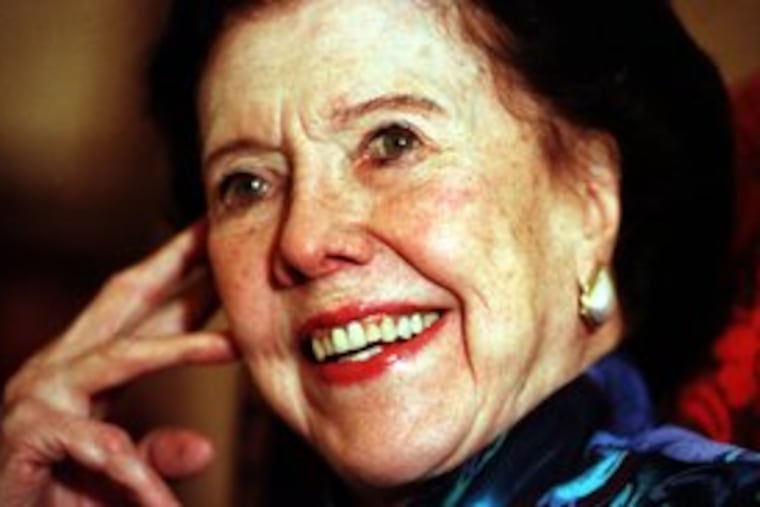Rose Bampton was a star of opera, her voice 'a miracle'
Rose Bampton, 99, the tall, green-eyed dramatic soprano who sang 18 seasons at the Metropolitan Opera and whose portrayal of the Wood Dove in Schoenberg's Gurrelieder was the first in the United States, died Tuesday in Bryn Mawr.

Rose Bampton, 99, the tall, green-eyed dramatic soprano who sang 18 seasons at the Metropolitan Opera and whose portrayal of the Wood Dove in Schoenberg's
Gurrelieder
was the first in the United States, died Tuesday in Bryn Mawr.
Bampton premiered songs of Samuel Barber, and was the first American to sing Parsifal's Kundry at the Met. Schoenberg called her voice "a miracle."
Others thought so, too. Her part in the Gurrelieder in 1932 with the Philadelphia Orchestra led by Leopold Stokowski was only one song in the enormous work. But the performance caught the ear of critics, and in turn the attention of the Metropolitan Opera, to which Bampton was invited for an audition.
A few months later, she made her Met debut - as a mezzo - in the role of Laura in La Gioconda with Rosa Ponselle.
In Wagnerian roles at the Met, Bampton sang Elsa in Lohengrin, Elizabeth in Tannhäuser, Sieglinda in Die Walküre and many others.
More recently, she was a frequent opera and orchestra listener, often taking the trip to the Metropolitan Opera. Her final visit, in April 2001, had special significance. She sat in the audience listening to Parsifal, admiring Placido Domingo and marveling that she had ever sung music so difficult. Afterward she went backstage, where her presence created a flurry that dwarfed any attention for Domingo.
"If only I had been able to sing my Parsifal to your Kundry," said the tenor.
Bampton was self-effacing in a way that is rare for divas, answering questions about her career only when asked directly. Like a silent-film star, her expressive eyes had a vocabulary all their own, and she could guide the direction of conversation with an incredulous look or quick ironic comment.
She was schooled in Philadelphia at the Curtis Institute of Music, and moved to Bryn Mawr from New York in the late 1980s to be near her brother, James Bampton, the Philadelphia industrialist and onetime chief executive of Krylon and music publisher Theodore Presser Co.
As a young singer, she pursued a peripatetic career that took her to Europe, Buenos Aires and the heartland of America.
Bampton's vocal range was something of a curiosity. She entered Curtis as a coloratura soprano, but soon found her voice wanting to sing lower, and settled into a mezzo range. At an audition at the Met, she found her register again in question.
"I had a cold, and they asked if there was anything else I could sing," Bampton told an interviewer for the radio documentary The Art of Rose Bampton. "I said the only thing I have is an aria I just learned. It's Rossini, and it has a great deal of scale work."
After she sang it, members of the panel laughed. "They said, 'We're laughing because we don't think that you are a mezzo. We're quite sure that you are going to be a soprano.' "
And so, eventually, she was - a dramatic soprano.
On occasion, Bampton ventured into popular repertoire, singing on radio shows of the 1940s. She once did a radio duet with Humphrey Bogart - a spoken one in which she played the straight part to his comic role.
Conductors dominated her personal and professional lives. On May 24, 1937, she married Montreal-born Wilfrid Pelletier (whom she called Pelly), the star-making Metropolitan Opera conductor who was the first music director of the Montreal Symphony Orchestra. He died in 1982.
She owed much to Stokowski, the Philadelphia Orchestra's first superstar conductor, who gave her that first big chance in Gurrelieder.
And she was close to Arturo Toscanini, with whom she performed and recorded, as well as his family.
Bampton was born in Lakewood, Ohio, and was raised in Buffalo, N.Y. She found her way to Curtis, where she studied with Queena Mario and was a muse to classmates Gian Carlo Menotti and Samuel Barber. Bampton made a practice of including works in her recitals by American composers. This was rare at the time, and she sang the premiere of two works by Barber: "Dover Beach" and "With Rue My Heart Is Laden."
For five years, she sang at the Metropolitan Opera when it was winter in New York, and at the important Teatro Colón in Buenos Aires when it was winter in South America.
When she wasn't singing in opera houses, she was entertaining guests in the Franklin D. Roosevelt or Eisenhower White House or performing the national anthem for such events as the opening of the 1939 World's Fair.
Her last stage appearance was in 1963, as the Old Prioress in Poulenc's Dialogue of the Carmelites. After retiring from singing, she taught at the Manhattan School of Music, North Carolina School of the Arts, and, from 1974 to 1991, the Juilliard School. Among her students were Susanne Mentzer and Hei-Kyung Hong. In recent years, her "girls," as she called her former students, visited her at her Bryn Mawr retirement home.
Many of her papers are kept at the New York Public Library.
Bampton performed with some of the great singers of the 20th century, including Bidú Sayão, Leonard Warren, Ezio Pinza, Helen Traubel, Lauritz Melchior, Nelson Eddy, Jan Peerce and Eleanor Steber. She was a frequent guest on Bing Crosby's radio shows.
The professional company she kept was something at which she repeatedly marveled.
"I think I lived in the most wonderful period, really, of singing and other things," she said.
Rose Bampton left no immediate family. Services will be held Saturday at 1 p.m. at St. David's Episcopal Church, 763 S. Valley Forge Rd., in Wayne.